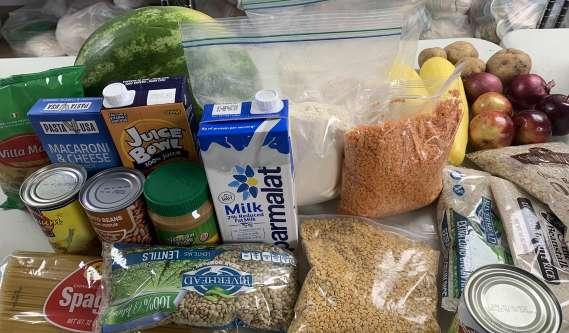
5 minute read
A Life of Service
from SEEMA December 2021 Issue
by SEEMA
Sudha Acharya has done more than many others to help South Asians in need in New York
NUPUR BHATNAGAR
Talking to Sudha Acharya, executive director of South Asian Council for Social Services (SACSS) was a revelation of sorts. With such amicability in her demeanor and a burning fervor for her mission, it’s hard not to feel her purpose in your own bones, too. Her 35 years of active work in the community tells a story of grueling work towards betterment of the South Asian immigrant population and ensuring their basic needs to food and information don’t go unrepresented.
Acharya has served in the city and state level health coalitions, and held many leadership positions. These include being president of the Federation of Indian Associations of New York, New Jersey and Connecticut (FIA), and chair of the Board of Trustees of the National Federation of Indian American Associations (NFIA).
“When we came to the US, it was mostly professionals, doctors, and academicians,” Acharya says. “Indians may not have been the model community just yet, but we were a well settled one. But with time we realized that is a myth. There is a lot of poverty among immigrants and if you don’t know English, your ability to work becomes limited, too. Especially for seniors, who feel isolated and depressed, food security and senior support is so important.” She also focuses on drawing attention to the lack of proper knowledge and awareness about available benefits, such as Medicaid and other preventive health services, that they are eligible for.
According to Acharya, to be able to assist, one must be able to connect with those who need it. “When people identify you as a part of their own community and realize that you know them culturally, they begin to trust you,” she says. “Our staff speaks 18 languages, 12 of those being South Asian. If one family comes out satisfied, they spread the word. And that’s how we grow. This year, we have already assisted 30,000 families.”

Above: A group of seniors on their way to a fun outing organized by SACSS
A typical bag from the food pantry serves the different needs of South Asian immigrants. The bag includes such provisions as rice, dal and wheat flour. Below: The line around the SACSS food pantry to receive food
“We provide case management, counseling and emotional health as well,” Acharya says. “For seven of our seniors who lost their spouses we started a grief support group. We all know how hard it is to navigate health insurance here, so that’s where we guide them.”
Lack of legal information again is a stumbling block Acharya and her team address.
“We have the support of council members who help us with information and legal issues and provide citizenship and immigration related advice,” she says.
Acharya still struggles with challenges that community service brings up. Acharya gives the example of an experience with an old cancer survivor.
“We took her to the food pantry we had at the time, but she could not find anything that she could eat,” Acharya says. “Being Telugu and having undergone chemotherapy, she had specific food needs. That got us thinking.”
In 2016, the group started a culturally inclusive and varied food pantry that could serve the different needs, like rice, dal and wheat flour for South Asian immigrants.


“We’ve grown since, but the challenge is to be able to get that food,” Acharya says. “Food banks don’t always have what desis eat. People have been kind with donation and it’s just a question of getting there,” she says.
Acharya’s work has of course not gone unnoticed. She has won the Union Square Award for her work at SACSS in 2003, the Pravasi Bhartiya Community Service Award from GOPIO in 2006, the India Abroad Gopal Raju Award for Community Service, and the Sri Vivekananda Award for Community Service in 2011. Acharya started her career as a project manager in what is now Verizon.
Her drive and zeal towards social welfare is the result of work done by her mother, who was also a social worker.
“Since I was a little girl, I followed her around,” Acharya says. “She was in the Social Welfare Board and started the Women’s Cooperative in our area in Karnataka. I would just follow her to villages and teach the young kid’s songs and direct plays for them. That’s what I grew up believing we do!”
She says the gratification of having made a difference in someone’s life keeps her going. She provided another example of that:
“We had an Afghan refugee once — undocumented, in poor health with no job and no money and barely eking out a living cleaning the house of the lady in whose basement she had found boarding. We helped her by finding a pharmacy that agreed to donate medicines to her. That smile on her face and others like her is what keeps us going.”
Acharya has represented the All-India Women’s Conference (AIWC) and a voluntary chair on the NGO Committee for the Status of Women for two terms, leading 200 organizations in consultative status with the United Nations.
“Women all over the world face the same problems, whether their country is developed or not,” Acharya says. “There is still the income disparity — of a woman’s 80 cents to a man’s dollar. And that lends a special feeling of comradery among women at these organizations.”
When she has the time, little as that is, Acharya loves diving into some science fiction and Greek mythology.
But Acharya’s main aim is to get the younger generation with their “ideas, commitment and temperament” to continue to be socially responsible.

Sudha Acharya has won several awards for her service, such as the the Union Square Award in 2003 and the Pravasi Bhartiya Community Service Award from GOPIO in 2006, among others.










